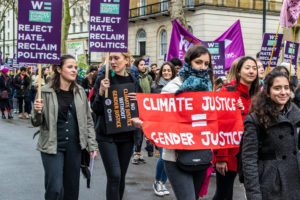By Britta Kallin and Sabine von Mering
I call on women to speak out and lead the way. We cannot wait, we have to act. Our children’s and grandchildren’s future is at stake.
Mary Robinson, Former President of Ireland

Feminists have embraced intersectional inquiries for a long time, integrating frameworks developed by women, minorities, the disabled, and other underrepresented groups. When society equated women and nature, feminist scholars responded with ecofeminist analyses. For half a century, ecofeminists have examined the implications of the destruction of the planet for women and girls. Ecofeminists have also analyzed connections between our capitalist economic system, patriarchy, colonization, right-wing and fascist groups, domestic abuse, suppression of women’s rights, and genocide. Feminist activism has been part of several waves of women’s movements and hands-on activism for more political participation and attention to the concerns of all who do not identify as male, be it by getting the right to vote one hundred years ago, fighting for abortion rights in the 1960s and 70s, and by joining LGBTQIA* activists since the 1980s.
Feminist scholars in Environmental and German Studies such as Ursula Heise, Christina Gerhardt, Bethany Wiggin, Gabriele Duerbeck, Charlotte Melin, Sabine Wilke, Joela Jacobs, Caroline Schaumann, Heather Sullivan, and many others have already published research in feminist ecocriticism and environmental humanities that allow for connections between culture, literature, film, and the climate activist movement. The German Studies curriculum has changed over time and now more and more scholars incorporate climate activism, environmental racism, and sustainability into their classes.

Feminists also have a clear role to play in fighting the climate crisis, that is the human-induced temperature increase that endangers all life, as well as the exploitation of the Earth through oil and gas extraction, fracking, and the pollution of soil and water. In the face of multiple global crises, feminist activists must join forces with climate activists and other activists fighting for social and environmental justice in a highly unequal world. Especially as scholars in higher education familiar with intersectional analysis, we should join young activists and use our megaphone to amplify the voices of the most vulnerable and the most impacted.
On November 5, 2019, thousands of the world’s climate scientists declared a climate emergency. Our unsustainable habitat destruction that allows for ever closer contact between humans and wildlife has been identified as one of the possible causes for the coronavirus (and other such infectious diseases). There are many parallels between the climate crisis and the coronavirus crisis, especially with regard to their impact on the most vulnerable populations: COVID-19 is revealing the stark inequalities in our existing economic and healthcare systems. While one third of the world’s population (predominantly upper and middle class) is sequestered at home, a majority of “essential” workers, most of them poor, black, and brown, are required to risk their lives on a daily basis, working for minimum wage in unsanitary conditions without space for social distancing. For a variety of reasons, African-Americans are dying at much higher numbers than their percentage of the population. Those caring for the sick and the elderly are at high risk of contracting the disease. Communities in many parts of the world, including in camps for migrants in Europe and native American territories in the US as well as many communities in Africa and Asia, lack access to safe water or sanitization. Those same communities are already hit hardest by climate impacts as well. How we deal with the implications of Covid-19 will impact our ability to address climate change.
Even at the time of the current Coronavirus pandemic, the fossil fuel industry and its political lobbyists are using the stay home orders to push through construction projects and are endangering frontline communities. https://www.desmogblog.com/2020/02/10/climate-justice-indigenous-solidarity-wetsuweten-rcmp-raids. Indigenous and labor activists are fighting the extractive corporate exploitation of people and planet, and feminist activists must join them to address the history of dangerous man camps and the disappearance and rape of indigenous women across the United States. Feminist activists cannot be silent in the face of such disregard for human rights and our collective survival as a species. We must acknowledge the leadership of our indigenous and frontline partners and target the corporate corruption within our political system that allows these projects to move forward.

Student and faculty divestment movements have successfully led to the divestment of trillions of endowment dollars at institutions of higher education around the world in order to reduce the fossil fuel industry’s outsize hold on our political system. As feminist activists we must join the student and faculty divestment movement and put pressure on the fiduciaries to divest endowment funds from fossil fuels and demand that those funds be invested in renewable energies and a sustainable future. We must support students who are organizing in groups such as Students Organizing for Sustainability and other student-led groups.
There is a lot we can do together:
- Join local, regional, and national groups dedicated to addressing these problems such as Fridays for Future, Students Working for Sustainability, etc. Some other examples are 350.org, Citizens’ Climate Lobby, Greenpeace, etc. Your town may already be a Transition Town in the global Transition Town Network. Seek out activist groups, community gardens, repair cafes, sharing networks in your neighborhoods.
- Become allies of feminists who are fighting for a better future, allies of climate activists who demand that governments and international organizations, companies etc. focus on reducing the carbon output. https://www.degrowth.info/en/feminisms-and-degrowth-alliance-fada/
- Support the divestment of funds and endowments going towards fossil fuels by re-directing those to companies that produce alternative energies. A national organization that supports students and faculty in the U.S. doing so is DivestEd: https://divested.betterfutureproject.org/our-partners
- Urge our professional organizations such as the WIG, GSA, AATG, MLA, NEMLA, SAMLA, ACTFL etc. to reduce the amount of air travel, single-use plastic, and meat consumption during conference banquets, and become more sustainable organizations overall. As paying and contributing members of these organizations, we must advocate that the leadership take practical steps to make our profession and our lives more sustainable, and urge colleagues and students to focus on climate activism.
- Incorporate and endorse some or all of the UN SDGs in our German Studies or Cultural Studies curricula. Students are eager to learn how to solve the climate crisis. It is our duty as instructors, lecturers, professors to give our students the tools to do so. One way is for them to see the connections between, for example, girls’ education and access to clean water. https://sustainabledevelopment.un.org/?menu=1300. At the same time a focus on ending violence against women and girls is crucial at a time of social distancing and widespread lockdowns that have led to skyrocketing reports of domestic abuse. https://www.un.org/sustainabledevelopment/ending-violence-against-women-and-girls/
Similarly, the UN SDGs also point to a continued effort of decolonization of suppressed minorities and thus groups such as the newly-formed Diversity, Decolonization, and the German Curriculum (DDGC) are important new voices and allies in the struggle for feminist climate action. - Support the young women who have stepped up as leaders of the youth climate movement in Fridays for Future, Sunrise, Zero Hour etc. – from Greta Thunberg in Sweden to Luisa Neubauer in Germany to Varshini Prakash and Jamie Margolin here in the United States and Vanessa Nakate in Uganda, among many others. The demands of their movements are grounded in intersectional analysis of our multiple crises – from climate change to Covid-19 to the economic fall-out and the threats to healthcare systems worldwide. They work in close cooperation with indigenous leaders, with immigrants rights and Black-Lives-Matter activists and the Marjory Stoneman Douglas High School/Parkland students who demand stricter gun control. Feminist scholars should take note, listen, and amplify these new voices whose future is at stake.
- Raise awareness about species extinction: The UN’s decade on biodiversity ends in 2020. The United Nations issued an alarming report in 2019 on the dramatic acceleration of species extinction. We must work in cooperation with and in support of the UN’s Convention on Biological Diversity and the Nagoya Protocol on Access to Genetic Resources and the Fair and Equitable Sharing of Benefits Arising from their Utilization. If you can, support organizations like the National Wildlife Federation, the Jane Goodall Institute, Sierra Club, National Audubon Society, Nature Conservancy, Oceana etc.
- Once we are involved in climate action, addressing our individual carbon footprint also becomes easier. There is a lot we can do in our homes, on our campuses, in our communities to reduce our carbon footprint and the cognitive dissonance we all feel. https://theyearsproject.com/learn/news/individual-solutions-climate-change/
Many of us may despair in light of the overwhelming confluence of crises, or feel helpless and frustrated with our limited agency as individuals in a capitalist society that largely ignores climate change and sustainability, but Covid-19 shows that every single person’s decisions make a difference. As feminist scholars in higher education in the United States we belong to those who are privileged to be able to think about these interconnections between feminist scholarship, climate activism, and what we teach in our classes. We cannot stay silent.
Literature:
Alaimo, Stacy. Undomesticated Ground: Recasting Nature as Feminist Space. Ithaca, NY: Cornell University Press , 2000.
Bell, Shannon Elizabeth. Our Roots Run Deep as Ironweed: Appalachian Women and the Fight for Environmental Justice. Urbana, IL: University of Illinois Press. 2013.
Brand, Ulrich et al., ed. Contours of Climate Justice: Ideas for Shaping New Climate and Energy Politics. Uppsala: Dag Hammarskjold Foundation. 2009.
Cochrane, Regina. “Climate Change, Buen Vivir, and the Dialectic of Enlightenment: Toward a Feminist Critical Philosophy of Climate Justice.” Hypatia 29(3): (2014). 576-598. http://onlinelibrary.wiley.com/doi/10.1111/hypa.12099/abstract
Green Grants. Women Climate Articles Resources:
https://www.greengrants.org/2014/07/21/women-climate-articles-resources/
Heise, Ursula K. Sense of Place and Sense of Planet: The Environmental Imagination of the Global. Oxford: Oxford University Press, 2006.
Kirk, Gwen. “Ecofeminism and Chicano Environmental Struggles: Bridges across Gender and Race.” Chicano Culture, Ecology, Politics. Ed. Devon Pena. Tucson, AZ: University of Arizona Press, 1999. 177-199.
Literary and Cultural Plants Studies Network:
Mortimer-Sandilands, Catriona and Bruce Erickson, ed. Queer Ecologies: Sex, Nature, Politics, Desire. Bloomington, IN: Indiana University Press, 2010.
Nellemann, Christian, Ritu Verma, and Lawrence Hislop, ed. Women at the Frontline of Climate Change: Gender Risks and Hopes. A Rapid Response Assessment. United Nations Environment Programme, GRID-Arendal, 2011. http://www.grida.no/publications/rr/women-and-climate-change/
Rigby, Kate. Dancing with Disaster: Environmental Humanities, Narratives, and Ethics for Perilous Times. Charlottesville, NC: University of Virginia Press, 2015.
Rocheleau, Dianne, Barbara Thomas-Slayter and Esther Wangari, ed. Feminist Political Ecology: Global Issues and Local Experiences. London: Routledge, 1996.
Rohas-Cheathan, Ann, Dana Ginn Parades, Shana Griffin, Aparna Shah, and Eveline Shen. Looking Both Ways: Women’s Lives at the Crossroads of Reproductive Justice and Climate Change. Asian Communities for Reproductive Justice. The Momentum Series – Expanding the Movement for Empowerment and Reproductive Justice. 2009. https://forwardtogether.org/tools/looking-both-ways/
Salleh, Ariel. Eco-Sufficiency and Global Justice: Women Write Political Ecology. New York: Pluto Press and Spinifex Press, 2009.
Schaumann, Caroline, and Heather Sullivan, ed. German Ecocriticism in the Anthropocene. New York: Palgrave, 2017.
Stein, Rachel, ed. New Perspectives on Environmental Justice: Gender, Sexuality, and Activism. New Brunswick: Rutgers University Press, 2004.
Wilke, Sabine. Narrating and Depicting Nature: The Modern German Environmental Imagination. Amsterdam: Brill-Rodopi, 2015.
Work that Reconnects:
https://workthatreconnects.org/
World Health Organization. 2014. Gender Climate Change and Health.
http://www.who.int/globalchange/GenderClimateChangeHealthfinal.pdf
Scholarly Organizations:
Curriculum for Sustainability
http://curriculumforsustainability.org/
Feminism and Degrowth Alliance (FADA)
https://www.degrowth.info/en/feminisms-and-degrowth-alliance-fada/
The Association of the Advancement of Sustainability in Higher Education
The Association for Literature and the Environment (ASLE)
